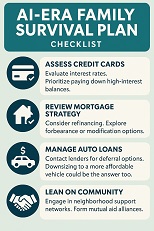How to Prepare for Economic Disruption Beyond Reskilling and Budget Cuts
The rise of AI is accelerating job loss and economic uncertainty. While governments talk about "reskilling" and "spending less," the truth is that these strategies alone may not be enough to shield families from the wave of "creative destruction" already underway. If mass unemployment, debt defaults, and forced relocations become the norm, families need a realistic, strategic Plan B.
This article outlines a practical survival strategy designed for families and close-knit communities to navigate economic hardship caused by AI-driven job loss, debt burdens, and systemic instability.

1. Strength in Numbers: Build Your Family & Friends Defense Circle
Isolation is a liability. In times of economic chaos, a trusted support network becomes your strongest asset.
Action Points:
- Identify reliable friends, neighbors, and extended family members.
- Discuss emergency co-living arrangements.
- Plan for resource sharing: food, transport, childcare, basic income pooling.
- Start an informal mutual aid fund with small monthly contributions.
Why it Matters: A well-prepared circle can prevent homelessness, reduce expenses, and offer emotional resilience.
2. Debt Triage: Survival-First Approach to Loans and Credit
Not all debt is equal. In a crisis, prioritize based on what's essential to keep your family stable.
Debt Priority Hierarchy:
#1 Shelter (Mortgage/Rent)
- Contact lenders early to negotiate hardship options.
- Explore shared housing before eviction looms.
- If loss is unavoidable, plan exit with minimal credit damage.
#2 Essential Transport (Car Loans)
- Sell, downsize, or transfer leases if payments become unmanageable.
- Consider car sharing with your circle.
#3 High-Interest Unsecured Debt (Credit Cards)
- Pay aggressively only after shelter and transport secured.
- Negotiate hardship programs with banks.
If unsustainable, consider strategic default or bankruptcy as last resorts.
3. Pre-Positioning Resources and Assets
A small buffer today can prevent disaster tomorrow.
Quick Wins:
- Build a modest emergency cash reserve.
- Stock basic non-perishable food and essentials.
- Secure critical documents in portable, accessible formats.
- Invest in inflation-resistant assets if feasible (tools, small equipment).
Don't look into crypto or precious metals until you have an emergency cash reserve of at least 6 months (better 12).
4. Legal Awareness: Know Your Rights Before Crisis Hits
Understanding the system prevents panic when things go wrong.
Check:
- Local eviction timelines and renter protections.
- Car repossession laws and procedures.
- Mortgage hardship clauses.
- Trusted contacts for legal advice or asset safeguarding.
Preparation in good times, make the hard times easier!
5. Parallel Economy & Side Income Preparation
If formal employment falters, alternatives can keep your family afloat.
Explore:
- Barter networks (skills, food, basic services). Wes' TikTok mini series on sourdough
- Cash-based side gigs.
- Micro-businesses providing essential, low-tech services.
- AI tools for your own productivity, not just corporate gain.
Make yourself stronger now with help of AI as a learning guide in all levels or life. Ask AI for cooking, baking, repairing, building, gardening or reskilling help and let it build a learning path.
6. Emotional Fortification: Mindset as a Survival Tool
Financial stress breaks more families than economic loss itself.
Prioritize:
- Honest, non-judgmental family conversations about preparedness.
- Regular support meetings within your circle.
- Small, achievable projects to maintain morale.
- Mental health support plans.
Make it a habit for your family to plan for the next year. Sit down once or twice a year to write what you as a family wants to achieve or experience in advance. These goals should be visible on a board in the kitchen or at a place where everyone passes it everyday. Reading them from time to time helps refocus and family binding as all see a plan and certainty.
Conclusion: Hope is Strategy, Not Luck
The AI revolution is real, and its economic impact is accelerating. But families and individuals who prepare strategically—beyond surface-level advice—can weather the storm with dignity and resilience.
Start quietly, plan practically, and build your defense network today.
Want this article as a printable checklist to share with your circle? Become a free member and we send you a copy -->
 Preparation starts with conversation. Our community is helping each other in a closed and safe space. Ask questions, follow others and see their saving activities.
Preparation starts with conversation. Our community is helping each other in a closed and safe space. Ask questions, follow others and see their saving activities.
Book recommendations on this topic
Relevant Links
Disclaimer: Links marked with * are affiliate links. If you buy through them, I may receive a small commission — at no extra cost to you. This helps support and run the website. Thanks for your support!
